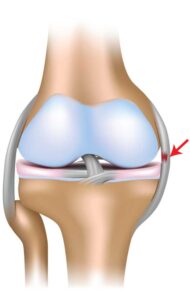Knee MCL Injury Specialist

Are you an athlete who participates in contact sports, or jumping and landing? If so, you may be at risk of tearing your MCL. An MCL injury can be sustained during an awkward landing in athletic activities, from a sports tackle or from a kick in mixed martial arts. MCL tear specialist, Doctor Riley J. Williams provides diagnosis as well as surgical and nonsurgical treatment options for patients in Manhattan, Brooklyn, New York City and surrounding areas who have sustained an MCL injury. Contact Dr. Williams’ team today!
What is an MCL Injury?
The medial collateral ligament is a thick, elastic band of tissue that connects the femur (thighbone) to the tibia (shinbone) and runs along the inner part of the knee. Its role is to keep the leg from bending too far inward, stabilize the knee, and to allow the knee to rotate properly. An MCL injury can result in a sprained MCL or an MCL tear. This can be caused if the knee takes a hit or blow on the lateral or outer side of the knee; such a blow can stretch the medial collateral ligament to a breaking point. These types of injuries are most often seen in football, during a tackle, or from hyperextending the knee while skiing. Repeated stress from athletics can also result in an MCL injury. It is not uncommon for athletes to suffer MCL and ACL injuries at the same time. Dr. Riley J. Williams, orthopedic knee specialist, serving Manhattan, Brooklyn, New York City, NY and surrounding areas, has extensive experience in treating MCL tears and other issues related to an MCL injury and MCL insufficiency issues.
What is a Medial Collateral Ligament Injury?
A medial collateral ligament injury can be partial or complete. The MCL is the main stabilizer of the medial or inner side of the knee. A partial tear of the MCL, also known as an MCL sprain, often results in medial knee pain and stiffness. Partial tears do not typically cause instability, but can hurt a great deal. A mild injury is a Grade I injury. A moderate injury in a Grade II injury. A severe (complete) MCL tear is a Grade III injury. Most MCL injuries heal without surgery. However, MCL injuries may require the patient to wear a stabilizing brace and to participate in formal physical therapy to achieve a complete recovery.
What is an MCL insufficiency?
Medical collateral ligament insufficiency occurs when there is a complete failure of the ligament following an acute injury. MCL insufficiency can follow an acute Grade III injury. MCL insufficiency is defined by the lack of functional MCL. Affected knees are unstable. This instability makes typical activities of daily living and sports very difficult. MCL insufficient knees do not typically hurt, however, affected knees collapse and give way. This condition will usually require repair and/or reconstruction of the medial collateral ligament with surgery.
What are the symptoms of an MCL tear or injury?
Tears and strains to the medial collateral ligament are one of the most common types of ligament injuries in the knee. A person who suffers an medial collateral ligament injury or tear may experience these symptoms:
- Popping sound when the injury occurs
- Sharp pain on the inner section of the knee
- Bruising around the knee
- Knee stiffness
- Feeling as if the knee has a greater, less stable range of motion
- Tenderness
- Immediate swelling
- Knee instability and giving way
- Inability to bear weight
How is a torn or injured MCL diagnosed?
Dr. Williams will ask questions of how your injury was sustained and where the pain is located. He will perform a physical examination to check for tenderness, pain, swelling and will conduct a range of motion test to determine if other injuries were also incurred. An MRI may be ordered to provide imaging of the damaged ligament(s). Dr. Williams may also order an x-ray to determine if injuries to the bone also occurred.
How is an MCL tear treated?
Non-surgical treatment:
Dr. Williams may recommend conservative treatment options depending on the severity of the strain or tear, and if there are other associated injuries. He may recommend the following:
- RICE (rest, ice, compression, elevation)
- NSAIDs (non-steroidal anti-inflammatories), such as ibuprofen to manage pain and swelling.
- Physical Therapy to help regain range of motion and strength.
- Knee Brace – to add stabilization while the ligament heals
Depending on the severity of your MCL injury, recovery could take up to eight weeks.
Surgical treatment:
Surgery is typically recommended only if there are other injuries associated with the MCL tear, such as an ACL tear, PCL tear or LCL tear.. The surgery could consist of either reattaching a portion of the torn medial collateral ligament or reconstructing the ligament using a graft. Dr. Williams may recommend the following:
- MCL Repair
- MCL Reconstruction
- Multi-ligament knee reconstruction
Recovery time will be dependent on factors such as age and severity of the injury. Physical therapy will be required to regain strength and range of motion in the knee.
For more information on MCL tears, injuries, medial collateral ligament insufficiency, and the treatment options available, please contact the office of Riley Williams, MD, orthopedic knee specialist serving Manhattan, Brooklyn, New York City, NY and surrounding areas.
Locations
610 W 58th Street
New York, NY 10019
148 39th Street, 7th Floor
Brooklyn, NY 11232



